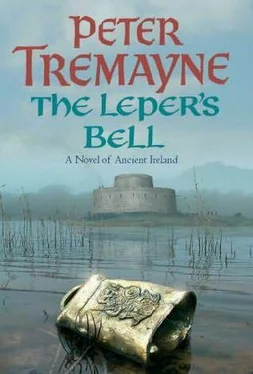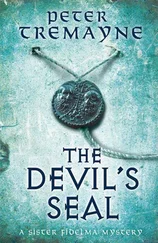Peter Tremayne - The Leper's bell
Здесь есть возможность читать онлайн «Peter Tremayne - The Leper's bell» весь текст электронной книги совершенно бесплатно (целиком полную версию без сокращений). В некоторых случаях можно слушать аудио, скачать через торрент в формате fb2 и присутствует краткое содержание. Жанр: Исторический детектив, на чешском языке. Описание произведения, (предисловие) а так же отзывы посетителей доступны на портале библиотеки ЛибКат.
- Название:The Leper's bell
- Автор:
- Жанр:
- Год:неизвестен
- ISBN:нет данных
- Рейтинг книги:4 / 5. Голосов: 1
-
Избранное:Добавить в избранное
- Отзывы:
-
Ваша оценка:
- 80
- 1
- 2
- 3
- 4
- 5
The Leper's bell: краткое содержание, описание и аннотация
Предлагаем к чтению аннотацию, описание, краткое содержание или предисловие (зависит от того, что написал сам автор книги «The Leper's bell»). Если вы не нашли необходимую информацию о книге — напишите в комментариях, мы постараемся отыскать её.
The Leper's bell — читать онлайн бесплатно полную книгу (весь текст) целиком
Ниже представлен текст книги, разбитый по страницам. Система сохранения места последней прочитанной страницы, позволяет с удобством читать онлайн бесплатно книгу «The Leper's bell», без необходимости каждый раз заново искать на чём Вы остановились. Поставьте закладку, и сможете в любой момент перейти на страницу, на которой закончили чтение.
Интервал:
Закладка:
‘I was just complimenting your wife on this stew,’ Eadulf assured him. ‘I was trying to pry her secret from her.’
The innkeeper sniffed in disapproval as he put down the drink.
‘You are kind to us, Brother. However, we would soon be out of business if we told passing strangers all our secrets.’
‘Then I shall not trouble you further except for a bed after I have eaten,’ replied Eadulf solemnly.
It was the waiting that irritated Fidelma. She could hear the voice of her old mentor, the Brehon Morann, intoning, ‘The person who prevails is the person who is patient, Fidelma.’ It had always been her major fault, if fault it were. ‘Impatience,’ she had once told the old judge, ‘is a sign that we have not resigned ourselves to mere hope of a solution but to its pursuit. To say, let us wait and see what fate provides, is no virtue. I would rather be doing something than sitting in inactive expectation.’ Brehon Morann had shaken his head sadly. ‘Learn patience, Fidelma, when patience is needed. Be impetuous and restless when that is needed. Above all, learn to differentiate between the need for either, for it is said that those who do not understand when patience is a virtue have no wisdom.’
The morning after Eadulf ’s departure, Fidelma had risen with a thousand thoughts cascading through her mind. For the rest of the day, following the departure of the Uí Fidgente chieftains, she had wandered the palace, pacing nervously, unable to settle to anything. Nothing distracted her from the worries that flooded her mind. Even old Brother Conchobar had not returned and Brehon Dathal was growing impossible. She found herself moving irritably from one room to another, from one place to the next. Now, as she rose to face a new day, she realised she could not go through yet another period of inactive frustration.
She went to the chapel and was relieved that there was no one about. Taking a seat in a dark corner, she closed her eyes, feeling the silence encompassing her.
She tried to concentrate, to clear her mind, seeking refuge in the art of the dercad , the action of meditation by which countless generations of the ascetics of her people had achieved the state of sitcháin , or peace, quelling extraneous thoughts and mental irritations. She tried to relax and calm the riot of thoughts that troubled her mind. Fidelma had been a regular practitioner of the ancient art in times of stress. Yet it was a practice which many leading religious in the churches of the five kingdoms were now denouncing. Even the Blessed Patrick, a Briton who had been prominent in establishing the Faith here, had expressly forbidden some of the meditative forms of self-enlightenment. However, the dercad , while frowned upon, was not as yet proscribed.
It was no use. The one time when she needed patience, she could not engage the ancient techniques. She surprised herself, for she had thought herself an adept in the method.
She rose abruptly and left the chapel.
Almost without knowing it she found herself at the stables. There was no one about, and she uttered a prayer of thanks for it. She wanted to be alone. To face the fears that dwelt in her mind. She found her horse, her favourite black mare, and after a short time she was leading it out through the gates of the palace complex.
The guards were standing around awkwardly.
‘Lady,’ one saluted her, ‘we have a duty to ask you not to go out alone. Not with the possibility of Uí Fidgente about.’
‘And your duty is therefore done,’ Fidelma replied curtly. ‘Have no concern. I am only going out for a ride.’
Before the man could protest, she had mounted and was urging the horse down the slope from the gates. The township which had grown up around the ancient fortress of the Eóghanacht, the capital of their great kingdom of Muman, lay to the south of the limestone rocky hill on which the palace rose, towering nearly two hundred feet above the plain which surrounded it. Instead of making for the township, she turned along the track that led round the rock and northward across the plain. Once out of the shadow of the palace complex, she dug in her heels and gave her mount its head.
Fidelma had learnt to ride almost before she could walk. She loved the experience of being at one with such a powerful beast, rider and horse working together in unison, speeding across the plain. Leaning forward, close to the mare’s neck, she cried words of encouragement as it thundered forward, and sensed the animal’s enjoyment at the lack of restriction, the freedom of movement, being able to fly like the wind without constraint.
It was only when she felt the sweat on the beast’s neck, and began to hear a slightly stertorous note enter its breathing, that she started to draw rein, to slow its pace and ease it to a trot, so that the sudden deceleration would not harm it. She finally reined it to a halt where the River Suir was joined by the Clodaigh, rushing down from the distant peak of Cnoc an Loig. She glanced up at the sun and realised it was well after noon and that her early morning ride had taken her many kilometres north of Cashel. Indeed, she realised to her surprise that she had come so far that, at this time of year, it would be dark by the time she had ridden back, and her horse was already tired from the exertion.
She sat undecided. Her brother kept a hunting lodge a few kilometres to the south-east at a vale called the Well of the Oak Grove, beside a little stream whose spring gave the spot its name. She could, at least, get a meal there before heading back to Cashel. The lodge was used as a hostel for those her brother chose to send there. There was no reason to ruin a good horse by riding it when it was so exhausted. She felt cheered by her decision.
She leant forward and patted the beast’s neck reassuringly, and then turned its head in the direction of the woods that surrounded the hunting lodge.
The way was, at least, across flat ground, for the great plain that spread north of Cashel stretched almost undisturbed as far as the eye could see from the top of the great rock on which the Eóghanacht palace stood. She walked her horse carefully along the track, which she knew led to her destination, moving slightly eastward through the forest.
Now that she had slowed her pace, and her mind was not preoccupied with the thrill of the gallop, her thoughts turned again to Eadulf and she felt both guilt and anxiety. Guilt for her own attitude and anxiety about the matter of Bishop Petrán. And why had Gorman ridden to the west? She was sure that he had gone after Eadulf — but why? Did Gorman believe that Eadulf was guilty? Brehon Dathal had said he would send someone after Eadulf. Had he instructed Gorman to go? And there was Gormán’s relationship with Delia. He claimed that he had loved Sárait. But he appeared intimate with Delia and Delia was surely twice his age. She shook her head in confusion.
What it came down to in the end was her attitude to Eadulf. Why did she not take him into her confidence and discuss things with him as she had in the early days? Why did she find herself indulging in constant contention with him? She knew deep within her that she had many faults — she did not like to share, not even confidences; she liked to work things out on her own without discussion with others. It was not just Eadulf she did not confide in. She was too self-centred.
She did not like revealing her emotions. Showing passion had hurt her when she was a young student. That was what made her reticent with Eadulf, or so she told herself. There were moments when she felt warm and tender towards him. And then a word, a look, and she felt the bitter words tumbling out and his responses causing more bitter words until she felt such anger that she could hardly control herself. Was there something wrong with her? Or was it simply a wrong chemistry between them? Or was it something simple — as simple as Eadulf’s being a foreigner? He wanted to return to his own land where he had status and she wanted to remain in her country where she had status and, moreover, where she could practise the occupation she loved most — the pursuit of the law. If there was to be some compromise, she could not make it. A trip to Rome, a trip to the Saxon kingdoms, had been enough for her. She could never live anywhere but Muman. This was her country, her life. There could be no concessions on her part, but would Eadulf ever compromise? He would surely see it as submission.
Читать дальшеИнтервал:
Закладка:
Похожие книги на «The Leper's bell»
Представляем Вашему вниманию похожие книги на «The Leper's bell» списком для выбора. Мы отобрали схожую по названию и смыслу литературу в надежде предоставить читателям больше вариантов отыскать новые, интересные, ещё непрочитанные произведения.
Обсуждение, отзывы о книге «The Leper's bell» и просто собственные мнения читателей. Оставьте ваши комментарии, напишите, что Вы думаете о произведении, его смысле или главных героях. Укажите что конкретно понравилось, а что нет, и почему Вы так считаете.











